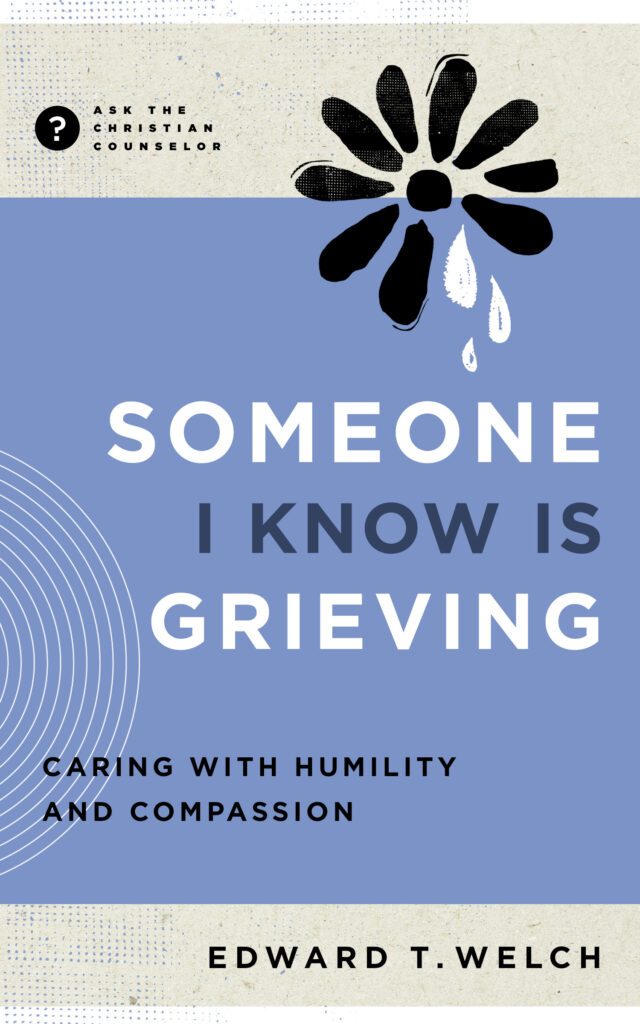When someone is grieving, it can be hard to know what to say or do. We want to be helpful, not hurtful, but it’s easy to go wrong. The good news is that we can learn to approach those who are grieving with the same compassion that Jesus shows us when we grieve. It starts with humility and listening well and expands into practical support as the Spirit leads us.
In Someone I Know Is Grieving: Caring with Humility and Compassion, Edward T. Welch leans on his many years of counseling grieving people to help readers learn from Jesus’s example how to respond to people’s sadness and hard times. Welch walks readers through the difficult task of coming alongside grieving people with genuine compassion and humility—without offering advice or trying to “fix” it. He encourages readers to instead listen to their grieving friend’s story, learn from others’ experiences, and depend on the Spirit for wisdom for what to say and do.
In this interview, we talked to Ed about the right—and the wrong—things to do and say when a friend is grieving.
Q: Most books are responding to a problem. What would you say is the problem that caused you to write this book?
My primary work is as a counselor, so I talk to people who are willing to talk about their grief and pain. In these conversations I have found a predictable pattern. First, grieving people are blessed by friends who care well and wisely for them. I am always surprised by how that encouragement does not come through someone giving theological answers, but it comes from ordinary people who are moved by the grief of others and grieving people can see it—they can feel it. Second, grieving people are inevitably hurt by the words or lack of words from others. In their hurt, they withdraw and are reluctant to share their hearts.
Q: Many books are written for personal reasons. Do you have more personal reasons for writing this book?
I have both helped and hurt grieving people with my words, and it is the discouraging words that I remember most. God used one particular experience to wake me up, confess my wrong to the person, and ask the Spirit to help me.
Q: What is the difference between being nice to a grieving person and being called by God to care?
The distinction is an important one. When we are nice, we say kind words, but they can be empty and detached. When we know that God has called us to do the “work of ministry” (Ephesians 4:12) we have a mission. That mission is to enhance unity and love in our churches so that the body of Christ it built up. Essential to that mission is that we become more skillful in pursuing, knowing, and blessing those who grieve.
Q: Before we think about how to help, we should know something about the person in front of us. What is the grieving and suffering person experiencing?
This is an enduring question for us. “Help me to understand what it is like for you to face your day.” That can be accompanied by, “When life has been especially hard, what have people said or done that has been helpful for you and unhelpful to you?” As you listen to grieving people you will hear images of feeling dead, being bone weary, feeling unable to even breathe, and today being just as hard as yesterday.
Q: When someone is grieving, we usually have good intentions to help, but we so often say things that are unhelpful. What are some of those words that hurt more than help and kill further conversation?
A wise goal is to develop an ever-expanding list of words that build up and words that tear down. Near the top of that list is giving advice. “Have you tried … reading Scripture, prayer, sleeping eight hours, avoiding caffeine, taking expensive vitamins …?” The advice might be sound, but it assumes that the person has not thought of anything that can help. When you give advice, you are the expert teacher; the grieving person is the student. This enlarges the distance between the two of you, when what the person is hoping for is someone who walks side-by-side.
Q: Sometimes we simply do not know what to say to a person who is suffering. Do you have any suggestions for us that might guide us?
As a general rule, do or say something that communicates you remember them and are affected by their pain. “I’m so sorry” can be enough, at least for now.
Q: We’ve heard it said, “Just listen.” But if we say nothing, can’t that come off as uncaring?
“Listening” can be merely hearing or engaging in a back-and-forth conversation. I have noticed how some people write about loud listening in which the person speaking knows—from small comments or facial expressions—that the other person has come close and shares the burden. If we are not loud listeners, then we become more skilled at short responses that keep your attention on the heart of the other person.
Q: In the title, you highlight humility and compassion as foundations in our care for each other. Why these in particular?
Our goal is to wisely love the person who grieves. Since love covers so much, I find it helpful to be led by two specific features of love that are also apparent in the life of Jesus. Humility is, first, humility before God. We need him and depend on him. Ephesians 4, which identifies that we are called by God to care for each other, begins “with all humility.” Compassion is how the Lord describes himself. “The Lord, the Lord, the compassionate and gracious God” (Exodus 34:6). The basic idea is that you are loved deeply as in, “”I love you in my bones, in the depths of my soul.” Compassion is love that is obvious.
Q: Could you give examples of how humility and compassion can guide us?
There are many. I’ll give two. Humility does not give advice. Instead, a humble person will pray for wisdom in how to bless a grieving person, and they would seek the advice of others. Compassion will not minimize a person’s suffering as in, “We should be thankful that this isn’t worse.” Compassion does not dole itself out according to how severe it judges a loss. It simply gives itself fully to being moved by a person’s grief.
Q: What are some things we can say or ask to show that we are interested in hearing more?
If the person grieves the loss of a loved one, and they say something about that person follow up. Be curious. “Tell me more. He was never showy in what he did, but he was so gifted.”
Q: Can you give suggestions for next steps we can take?
We never arrive as experts. So we identify where we have been unhelpful in our words to grieving people, ask wise people for their help, and then consider how you might approach a person you know who is grieving. Knowing that the wisdom we need in our care for others is always able to grow, means we ask the Spirit and others to teach us how to love the grieving well.
Someone I Know is Grieving
In Someone I Know Is Grieving, Edward T. Welch leans on his many years of counseling grieving people to help readers learn from their compassionate Savior how to respond to people’s sadness and hard times without advice or trying to “fix it,” but to instead hear their story, learn from others’ experiences, and depend on the Spirit for wisdom for what to say and do.






